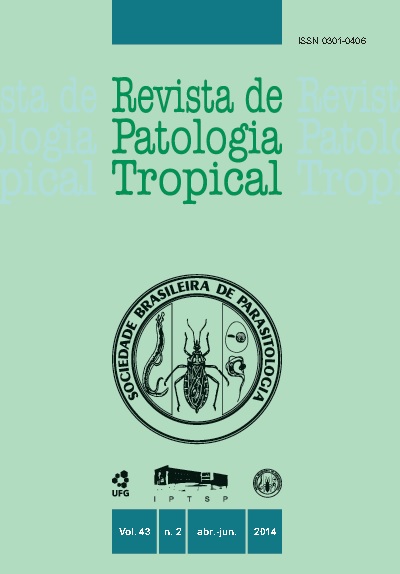FREQUENCY OF INTESTINAL PARASITES IN DOG STOOL SAMPLES IN A TOWN OF THE PONTAL DO TRIÂNGULO REGION, MINAS GERAIS STATE, BRAZIL
DOI:
https://doi.org/10.5216/rpt.v43i2.31124Keywords:
Dogs, Giardia spp., coccidiaAbstract
Dogs are considered important reservoirs of intestinal parasites due to their coprophagic behavior and close interaction with humans. The objective of this study was to determine the prevalence of Giardia spp. cysts and of coccidia oocysts in dog stool samples collected at the Zoonosis Control Center (CCZ) and at pet shops in Ituiutaba town, in the state of Minas Gerais, Brazil. Eighty stool samples (40% puppies and 60% adult dogs) were collected from dogs of both genders in individualand collective kennels. Cysts were then isolated from the samples using Sheather’s solution, and the oocysts were isolated in accordance with a modified version of the protocol by Ortega-Mora (1999). Thirty-four (42.5%) of dog samples were found to be positive for Giardia spp., 26 (51.0%) of which came from the CCZ, and 8 of which (27.6%) came from the pet shops. There was a prevalence of 13.72% (7) of oocysts in stool samples of CCZ dogs, and of 34.48% (10) oocysts in pet shop animals. The high prevalence of Giardia spp. cysts and oocysts in the samples may be associated
with exposure to parasites from stray dogs. Clustering of animals in collective kennels or pet shops promotes the risk of intestinal parasite transmission with high zoonotic potential for the animals and for the people living with them.
Downloads
Downloads
Published
How to Cite
Issue
Section
License
The manuscript submission must be accompanied by a letter signed by all authors stating the full name and email address, confirming that the material has not been published or is under consideration for publication elsewhere, and agreeing to transfer copyright in all media and formats for Journal of Tropical Pathology. The authors will not be paid for published articles. They are solely responsible for the content of those articles, even if the Editor holds the right to adjust them to the norms of the journal.
The reviewers will not be paid for the peer review process.

